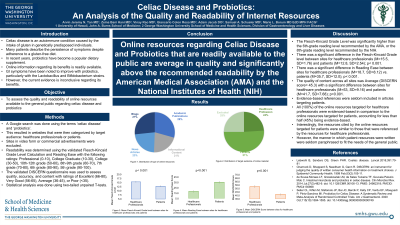Tuesday Poster Session
Category: Small Intestine
P4936 - Celiac Disease and Probiotics: An Analysis of the Quality and Readability of Internet Resources
Tuesday, October 29, 2024
10:30 AM - 4:00 PM ET
Location: Exhibit Hall E

Has Audio

Arvin Jeremy Tan, MD
University of Hawaii, John A. Burns School of Medicine
Honolulu, HI
Presenting Author(s)
Arvin Jeremy Tan, MD1, Zeina Bani Hani, MBBS2, Vinay Rao, MD2, Giancarlo Colon Rosa, MD2, Adam Jacob, MD2, Samuel A.. Schueler, MD2, Marie L.. Borum, MD, MPH, FACG2
1University of Hawaii, John A. Burns School of Medicine, Honolulu, HI; 2George Washington University School of Medicine and Health Sciences, Washington, DC
Introduction: Celiac disease is an autoimmune condition caused by the intake of gluten in genetically predisposed individuals. Many patients describe the persistence of symptoms despite adherence to a gluten-free diet. There has been an increase in the popularity of probiotic use which has been shown to improve symptoms. Online information regarding its benefits is readily available. This study used validated assessment tools to analyze websites for quality and readability, and compared differences between sites targeted for patients or healthcare professionals.
Methods: A Google search using the terms ‘celiac disease’ and ‘probiotics' resulted in websites that were categorized by target audience: healthcare professionals or patients. Sites in video form or commercial advertisements were excluded. Readability was determined using the validated Flesch-Kincaid Grade Level Calculation and Reading Ease with ratings of Professional (0-10), College Graduate (10-30), College (30-50), 10th-12th grade (50-60), 8th-9th grade (60-70), 7th grade (70-80), 6th grade (80-90), 5th grade (90-100). The validated DISCERN questionnaire was used to assess quality, accuracy, and content with ratings of Excellent (66-80), Very Good (56-65), Average (36-45), or Poor (< 35). Statistical analysis was done using a two-tailed unpaired T-test.
Results: 100 websites were collected with 25 excluded. 51 sites targeted patients, and 24 targeted healthcare professionals. Of the 75 analyzed, 22 were academic publications, 16 were informational or non-academic educational content, 17 were news articles, and 20 were blogs. There was a significant difference in the Flesch-Kincaid Grade level between sites for healthcare professionals (M=15.5, SD=1.76) and patients (M=12.8, SD=2.54); p< 0.001, as well as reading ease between sites for healthcare professionals (M=18.7, SD=8.12) vs. patients (M=35.7, SD=12.0); p< 0.001. The quality of content across all sites was Average (DISCERN score= 45.3) with a significant difference between sites for healthcare professionals (M=53, SD=9.16) and patients (M=41.7, SD=7.68); p< 0.001.
Discussion: The readability of online information on celiac disease and probiotics was significantly higher than the 6th-grade reading level recommended by the AMA, or the 8th-grade reading level recommended by the NIH. Providers must be aware of the limitations of online resources to effectively guide patients to appropriate resources to make an informed decision about supplements.
Disclosures:
Arvin Jeremy Tan, MD1, Zeina Bani Hani, MBBS2, Vinay Rao, MD2, Giancarlo Colon Rosa, MD2, Adam Jacob, MD2, Samuel A.. Schueler, MD2, Marie L.. Borum, MD, MPH, FACG2. P4936 - Celiac Disease and Probiotics: An Analysis of the Quality and Readability of Internet Resources, ACG 2024 Annual Scientific Meeting Abstracts. Philadelphia, PA: American College of Gastroenterology.
1University of Hawaii, John A. Burns School of Medicine, Honolulu, HI; 2George Washington University School of Medicine and Health Sciences, Washington, DC
Introduction: Celiac disease is an autoimmune condition caused by the intake of gluten in genetically predisposed individuals. Many patients describe the persistence of symptoms despite adherence to a gluten-free diet. There has been an increase in the popularity of probiotic use which has been shown to improve symptoms. Online information regarding its benefits is readily available. This study used validated assessment tools to analyze websites for quality and readability, and compared differences between sites targeted for patients or healthcare professionals.
Methods: A Google search using the terms ‘celiac disease’ and ‘probiotics' resulted in websites that were categorized by target audience: healthcare professionals or patients. Sites in video form or commercial advertisements were excluded. Readability was determined using the validated Flesch-Kincaid Grade Level Calculation and Reading Ease with ratings of Professional (0-10), College Graduate (10-30), College (30-50), 10th-12th grade (50-60), 8th-9th grade (60-70), 7th grade (70-80), 6th grade (80-90), 5th grade (90-100). The validated DISCERN questionnaire was used to assess quality, accuracy, and content with ratings of Excellent (66-80), Very Good (56-65), Average (36-45), or Poor (< 35). Statistical analysis was done using a two-tailed unpaired T-test.
Results: 100 websites were collected with 25 excluded. 51 sites targeted patients, and 24 targeted healthcare professionals. Of the 75 analyzed, 22 were academic publications, 16 were informational or non-academic educational content, 17 were news articles, and 20 were blogs. There was a significant difference in the Flesch-Kincaid Grade level between sites for healthcare professionals (M=15.5, SD=1.76) and patients (M=12.8, SD=2.54); p< 0.001, as well as reading ease between sites for healthcare professionals (M=18.7, SD=8.12) vs. patients (M=35.7, SD=12.0); p< 0.001. The quality of content across all sites was Average (DISCERN score= 45.3) with a significant difference between sites for healthcare professionals (M=53, SD=9.16) and patients (M=41.7, SD=7.68); p< 0.001.
Discussion: The readability of online information on celiac disease and probiotics was significantly higher than the 6th-grade reading level recommended by the AMA, or the 8th-grade reading level recommended by the NIH. Providers must be aware of the limitations of online resources to effectively guide patients to appropriate resources to make an informed decision about supplements.
Disclosures:
Arvin Jeremy Tan indicated no relevant financial relationships.
Zeina Bani Hani indicated no relevant financial relationships.
Vinay Rao indicated no relevant financial relationships.
Giancarlo Colon Rosa indicated no relevant financial relationships.
Adam Jacob indicated no relevant financial relationships.
Samuel Schueler indicated no relevant financial relationships.
Marie Borum: Takeda Pharmaceuticals – Consultant, Speakers Bureau.
Arvin Jeremy Tan, MD1, Zeina Bani Hani, MBBS2, Vinay Rao, MD2, Giancarlo Colon Rosa, MD2, Adam Jacob, MD2, Samuel A.. Schueler, MD2, Marie L.. Borum, MD, MPH, FACG2. P4936 - Celiac Disease and Probiotics: An Analysis of the Quality and Readability of Internet Resources, ACG 2024 Annual Scientific Meeting Abstracts. Philadelphia, PA: American College of Gastroenterology.
